Ellen Baumler's Blog, page 32
September 11, 2013
Marcus Daly’s Romance
Copper king Marcus Daly was the youngest of eleven siblings and began his career as a penniless Irish immigrant. He arrived in New York in 1856 when he was only fifteen years old. But Daly had a keen sense of business and a Midas touch with an uncanny instinct for the veins of copper that made his huge fortune. He founded Hamilton and Anaconda and was a generous patron to his fellow Irishmen and a benevolent boss to his workingmen. And he never forgot his humble Irish roots. But aside from al...
Published on September 11, 2013 10:17
September 9, 2013
Stagecoach versus Automobile in Yellowstone Park
In his book Death in Yellowstone, Lee Whittlesey details all the known catastrophes that have occurred in Yellowstone National Park. He writes of the last stagecoach wreck that happened in the park in 1916 and was likely the reason horse-drawn conveyances were thereafter removed from the park. The automobile had already more or less taken over Montana’s roadways. 1916 was the only year that the park had both automobiles and horses on the same roads. The Wylie Camping Company was operating a f...
Published on September 09, 2013 10:13
September 6, 2013
Friday Photo: Wranglers
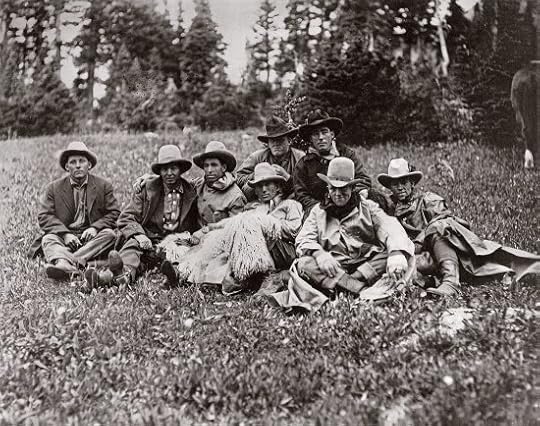 Montana Historical Society Photograph Archives, 956-463These strapping wranglers led parties of trail riders through Glacier National Park in 1917. A. J. Baker snapped the photo.
Montana Historical Society Photograph Archives, 956-463These strapping wranglers led parties of trail riders through Glacier National Park in 1917. A. J. Baker snapped the photo.P.S. Remember this tough cowboy?
P.P.S. More photos of Glacier here and here.
Published on September 06, 2013 13:58
September 4, 2013
C. E. Conrad Memorial Cemetery
One fine fall day in 1902, Kalispell founder Charles E. Conrad and his wife Alicia took a last horseback ride to a favorite area and rested on the narrow overlook where the valley spread below. Charles told his wife there could be no lovelier place for his final rest. Charles died weeks later, but not before he sketched the mausoleum he wanted Alicia to build in the place he had chosen.
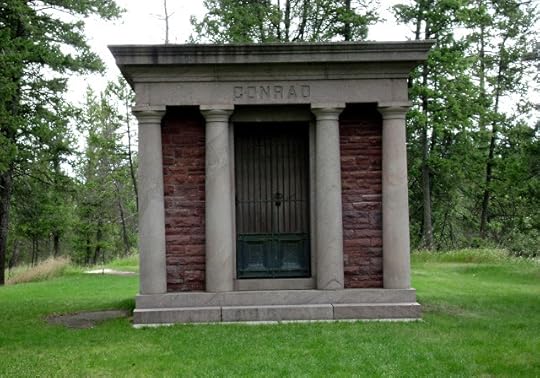
She carried out her husband’s wishes and had more than one hundred stone steps set into the steep clif...

She carried out her husband’s wishes and had more than one hundred stone steps set into the steep clif...
Published on September 04, 2013 10:15
September 2, 2013
Mad as a Hatter
The process of making fabric called felt goes back to ancient civilization and may even predate spinning and weaving. The undercoat of certain animals—including rabbit, muskrat, and beaver—contains microscopic scales that cling together. The pelts were shaved to obtain this underhair which was repeatedly submerged in boiling water, then drained and kneaded like bread dough. This caused the scales to open and cling together. The drying process caused the scales to shrink, thus locking them tog...
Published on September 02, 2013 09:43
August 30, 2013
Friday Photo: Bannack, Montana
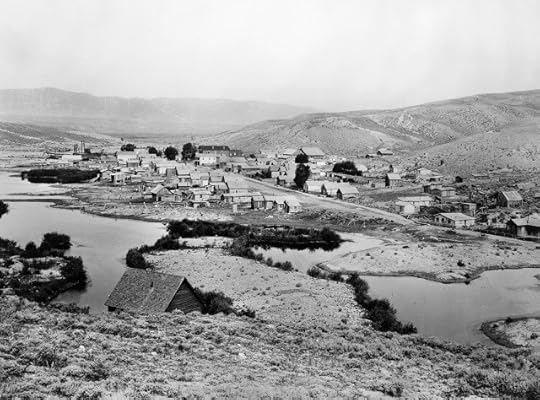 Montana Historical Society Photograph Archives, 940-695Did you hear about the flash flood that swept through Bannack in July? Today's photo shows the town as it was circa 1900, looking west. The dredge on the left was launched in 1895. Click the photo for a bigger version.
Montana Historical Society Photograph Archives, 940-695Did you hear about the flash flood that swept through Bannack in July? Today's photo shows the town as it was circa 1900, looking west. The dredge on the left was launched in 1895. Click the photo for a bigger version.P.S. A beautiful photographic tribute to Bannack
P.P.S. The Bannack Association has posted lots of photos of the cleanup, plus historic photos.
P.P.P.S. Do you think Bannack's Meade Hotel is haunted?
Published on August 30, 2013 13:04
August 28, 2013
Homesteaders Take Care of Their Own
"Ma” Smith, a homesteading wife in Garfield County, was locally well known and greatly respected. She is a good example of women in isolated places who sometimes made difficult personal choices and material sacrifices because there was no one else to make them. In addition to running her own homesteading partnership with her husband, Ma was a practical nurse who traveled with elderly Doctor Lon Keith. Dr. Keith had given up his practice, but came out of retirement because Garfield County desp...
Published on August 28, 2013 10:17
August 26, 2013
Auditor
Butte’s Berkeley Pit is as poisonous as battery acid. An entire flock of snow geese mistakenly landed on its surface in 1995 and died before they could take flight. But for one lonely matted, mangy canine, the pit’s acrid, crusted shores were home for seventeen lonely years. No one knows where the dog came from. The handful of miners working at Montana Resources, Butte’s only active mining company, named him Auditor because they could never predict when he would show up. He was not a friendly...
Published on August 26, 2013 10:16
August 23, 2013
Friday Photo: Fighting Wildfires
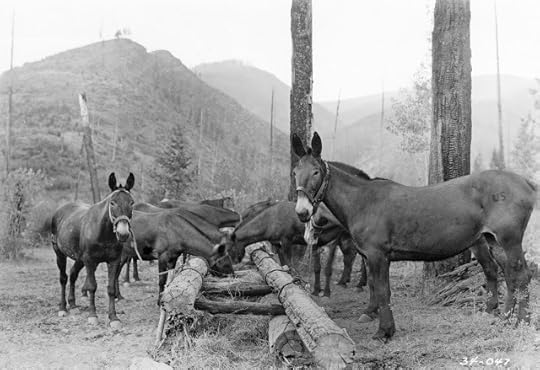 Montana Historical Society Photograph Archives, PAc 2003-47.25Humans aren't the only ones working to contain wildfires. These pack mules from the U.S. Forest Service Remount Station carried tools and food to men on the Forest Service fire lines. They got a well-deserved meal at the Swamp Creek Base Fire Camp in this July 19, 1938, photo. The photo's caption reads: "CCC [Civilian Conservation Corps] enrollees from Co.'s 297, 591, 952-956, 1962, and 1998 spent a tough week here."
Montana Historical Society Photograph Archives, PAc 2003-47.25Humans aren't the only ones working to contain wildfires. These pack mules from the U.S. Forest Service Remount Station carried tools and food to men on the Forest Service fire lines. They got a well-deserved meal at the Swamp Creek Base Fire Camp in this July 19, 1938, photo. The photo's caption reads: "CCC [Civilian Conservation Corps] enrollees from Co.'s 297, 591, 952-956, 1962, and 1998 spent a tough week here."P.S....
Published on August 23, 2013 09:40
August 21, 2013
Fort Keogh
Fort Keogh was established in July 1876 in the few weeks following the Custer loss at Little Bighorn. The army cavalry post takes its name from Captain Myles Keogh who served under Custer and died in the battle. The fort’s commander was General Nelson Miles. In 1879, Miles City—whose name honors the general—became the first seat of Custer County, and the fort grew to be one of the largest in the territory.
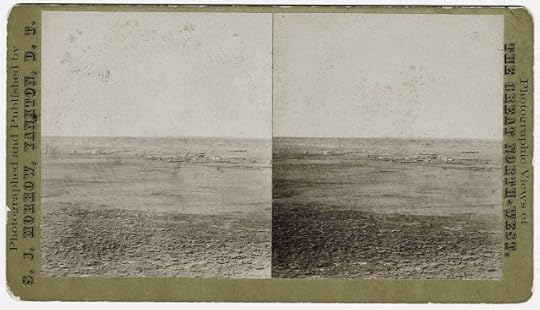 A distant view of Fort Keogh, c. 1878. Montana Historical Society Photograph Archives, ST...
A distant view of Fort Keogh, c. 1878. Montana Historical Society Photograph Archives, ST...
 A distant view of Fort Keogh, c. 1878. Montana Historical Society Photograph Archives, ST...
A distant view of Fort Keogh, c. 1878. Montana Historical Society Photograph Archives, ST...
Published on August 21, 2013 09:35



